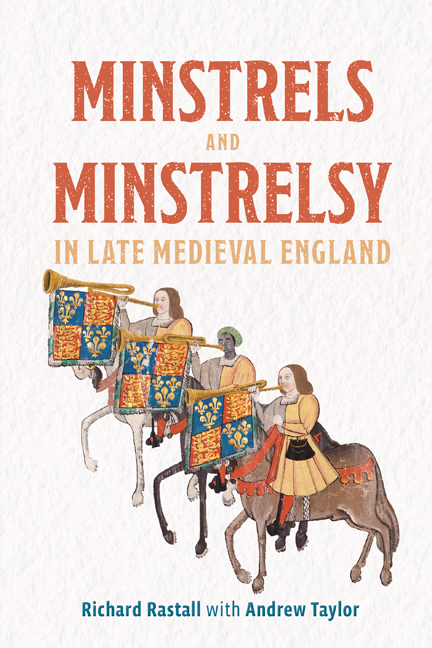Book contents
- Frontmatter
- Dedication
- Contents
- List of illustrations
- List of music examples
- List of abbreviations
- A note on references
- A note on money
- A note on dates
- Preface
- Acknowledgments
- Part I Minstrels and Minstrelsy in the Elite Households
- Part II Urban Minstrelsy
- Part III On the Road
- Part IV Minstrel Performance
- Envoi
- Bibliography
- Index
13 - Minstrels and heralds and chivalric fame
Published online by Cambridge University Press: 09 January 2024
- Frontmatter
- Dedication
- Contents
- List of illustrations
- List of music examples
- List of abbreviations
- A note on references
- A note on money
- A note on dates
- Preface
- Acknowledgments
- Part I Minstrels and Minstrelsy in the Elite Households
- Part II Urban Minstrelsy
- Part III On the Road
- Part IV Minstrel Performance
- Envoi
- Bibliography
- Index
Summary
Fame and the gestour
In his comic meditation on fame and rumour, The House of Fame (c. 1380), Chaucer describes a dream in which he was seized by an eagle and brought to ‘Fames Hous’ a place ‘full of tidynges, / Bothe of feir speche and chidynges, / And of fals and soth compouned’. He sees a hill of ice, on which are carved ‘famous folkes names’ that are all but effaced on the southern side but still fresh on the northern one. On the top of the hill is perched a castle, whose outer walls are covered with niches filled not with statues but with living performers:
In which [niches] stoden, al withoute –
Ful the castel, al aboute –
Of alle maner of mynstralles
And gestiours that tellen tales
Both of wepinge and of game,
Of al that longeth unto Fame. (lines 1195–1200)
The list of minstrels begins with Orpheus and includes Orion (that is Arion of Corinth), Achille's tutor Chiron, the bard Glascurion, Marcia, flayed for daring to challenge Apollo, and a host of ‘small harpers with her glees’. The panoply of minstrels includes players of shawms bagpipes, horns, and shepherd's pipes, trumpeters, Dutch pipers and Spanish trumpeters, and also a wide range of illusionists, jugglers, magicians, tregetours (experts in special effects), old witches, sorceresses, and astrologers, and such famous enchantresses as Medea and Circe. Here is minstrelsy as both music and enchantment, all contributing to the preservation of fame, deserved or undeserved, sought or avoided. This activity, according to Chaucer, is led by the ‘gestiours’ who are tellers of tales.
Chaucer's use of the term gestour is not unusual. In England the most common terms for someone who sang of the deeds of great men, their gesta, was either gestour or disour, one who tells a dit or simply one who speaks, and both terms recur frequently in the Middle English romances. Richard Coer de Lyon promises us ‘Noble jestes … Off doughty knyghtes off Yngelonde’.
- Type
- Chapter
- Information
- Minstrels and Minstrelsy in Late Medieval England , pp. 291 - 314Publisher: Boydell & BrewerPrint publication year: 2023



